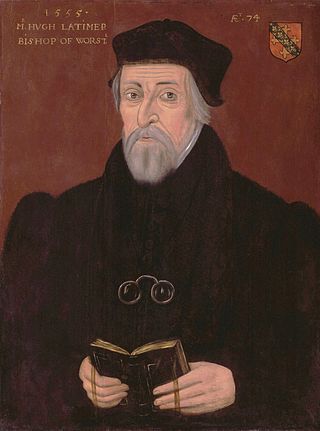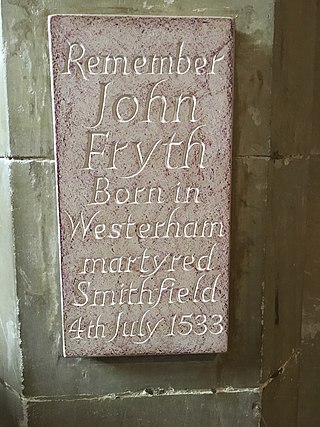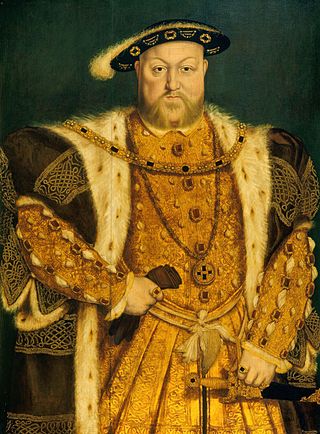Related Research Articles

Sir Thomas More, venerated in the Catholic Church as Saint Thomas More, was an English lawyer, judge, social philosopher, author, statesman, amateur theologian, and noted Renaissance humanist. He also served Henry VIII as Lord High Chancellor of England from October 1529 to May 1532. He wrote Utopia, published in 1516, which describes the political system of an imaginary island state.

Thomas Cranmer was a theologian, leader of the English Reformation and Archbishop of Canterbury during the reigns of Henry VIII, Edward VI and, for a short time, Mary I. He is honoured as a martyr in the Church of England.
William Tyndale was an English Biblical scholar and linguist who became a leading figure in the Protestant Reformation in the years leading up to his execution. He translated much of the Bible into English, and was influenced by the works of prominent Protestant Reformers such as Martin Luther.

John Rogers was an English clergyman, Bible translator and commentator. He guided the development of the Matthew Bible in vernacular English during the reign of Henry VIII and was the first English Protestant executed as a heretic under Mary I, who was determined to restore Roman Catholicism.

Hugh Latimer was a Fellow of Clare College, Cambridge, and Bishop of Worcester during the Reformation, and later Church of England chaplain to King Edward VI. In 1555 under the Catholic Queen Mary I he was burned at the stake, becoming one of the three Oxford Martyrs of Anglicanism.
John Bell was a Bishop of Worcester (1539–1543), who served during the reign of Henry VIII of England.

John Frith was an English Protestant priest, writer, and martyr.
Jerome of Prague was a Czech scholastic philosopher and theologian. Jerome was one of the chief followers of Jan Hus and was burned for heresy at the Council of Constance.

Rowland Taylor was an English Protestant martyr during the Marian Persecutions.
Joan Bocher was an English Anabaptist burned at the stake for heresy during the English Reformation in the reign of Edward VI. She has also been known as Joan Boucher or Butcher, or as Joan Knell or Joan of Kent.
Nicholas Shaxton was Bishop of Salisbury. For a time, he had been a Reformer, but recanted this position, returning to the Roman faith. Under Henry VIII, he attempted to persuade other Protestant leaders to also recant. Under Mary I, he took part in several heresy trials of those who became Protestant martyrs.

Thomas Harding was a sixteenth-century English religious dissident who, while waiting to be burnt at the stake as a Lollard in 1532, was struck on the head by a spectator with one of the pieces of firewood, which killed him instantly.

The Tyndale Bible (TYN) generally refers to the body of biblical translations by William Tyndale into Early Modern English, made c. 1522–1535. Tyndale's biblical text is credited with being the first Anglophone Biblical translation to work directly from Hebrew and Greek texts, although it relied heavily upon the Latin Vulgate and Luther's German New Testament. Furthermore, it was the first English biblical translation that was mass-produced as a result of new advances in the art of printing.
Simon Fish was a 16th-century Protestant rebel and English propagandist. He is best known for helping to spread William Tyndale's New Testament and for writing the vehemently anti-clerical pamphlet Supplication for the Beggars which the Roman Catholic Church condemned as heretical on 24 May 1530. His pamphlet can be seen as a precursor to the English Reformation and the Protestant Reformation. Fish was eventually arrested in London on charges of heresy, but he was stricken with bubonic plague and died before he could stand trial. His widow married vocal reformer James Bainham, and then became a widow again in April 1532 when Bainham was burned at the stake as a heretic.
Thomas Hitton is generally considered to be the first English Protestant martyr of the Reformation, although the followers of Wycliffe - the Lollards - had been burned at the stake as late as 1519.

The English Reformation took place in 16th-century England when the Church of England broke away first from the authority of the Pope and bishops over the King and then from some doctrines and practices of the Catholic Church. These events were part of the wider European Reformation: various religious and political movements that affected both the practice of Christianity in Western and Central Europe and relations between church and state.
William Tracy was an English justice of the peace and prominent early Lutheran convert. After his death both his will and his remains became caught up in the struggle around the Protestant Reformation in England.
Thomas Gerard (1500?–1540) was an English Protestant reformer. In 1540, he was burnt to death for heresy, along with William Jerome and Robert Barnes.
Edward Crome was an English reformer and courtier.
John Tewkesbury was a Paternoster Row leather merchant in London and Protestant reformer, convicted of heresy and burned at the stake in West Smithfield, London, on 20 December 1531.
References
 This article incorporates text from a publication now in the public domain : "Bainham, James". Dictionary of National Biography . London: Smith, Elder & Co. 1885–1900.
This article incorporates text from a publication now in the public domain : "Bainham, James". Dictionary of National Biography . London: Smith, Elder & Co. 1885–1900.